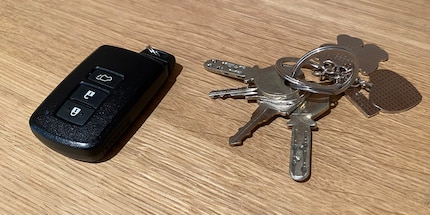
Guide
Nine tips on how to be a better Bitcoin broker
by Raphael Knecht

Smart contracts are based on the blockchain and work via algorithms. This is supposed to provide more security and make middlemen superfluous. Still, self-fulfilling contracts are controversial.
The Blockchain is one of the main reasons why cryptocurrencies work and are successful. Smart contracts build on this same collective network. This way, you can make trustworthy transactions and enter into agreements with digital, self-fulfilling and intelligent contracts. The parties involved remain anonymous. And there’s no need for central authorities, a legal system or an external enforcement tool to complete them. But what sounds super positive, secure and future-oriented at first glance also has its dark sides. That’s why it’s a good idea to take a look at how it works and what some of the pros and cons are.
Computer scientist and cryptographer Nick Szabo first proposed the idea of smart contracts that work via blockchain in 1993. In some circles of the crypto community, Szabo is also theorised to be the inventor of Bitcoin. Like Bitcoin and co., smart contracts are based on computer protocols. They’re similar to the traditional contracts you sign when you buy a car or accept a job offer. Standard contracts contain one or more agreements – legally binding declarations of intent – between at least two parties. Usually, this type of non-digital contract is made in writing. Intelligent contracts based on the blockchain also contain this information.

Smart contracts are cheaper and more efficient. The contracts are self-executing, so human error can be almost completely ruled out. They run strictly according to how they’ve been programmed. For example: you rent an apartment that you can only get into once you’ve paid rent. All the conditions of the contract are written down in lines of code. Thanks to the blockchain, the code and agreements are distributed and stored in a decentralized network. Whenever the contract is accessed, all parties involved are notified. This is only possible thanks to the fact that the network that’s used is accessible to everyone. It’s just like for cryptocurrencies: the blockchain mechanism makes intelligent contracts of this type comprehensible, transparent and irrevocable.
Suppose you want to buy a car using a smart contract. You choose the right vehicle online, transfer the purchase amount and pick up your car at the specified location. You no longer need a salesman or hand-over of keys. This is because the smart contract contains all the terms of the contract. As soon as the money reaches the car manufacturer's account, the car is released for you. Whether it’s via combination lock, smart card or fingerprint: the car opens for you as soon as you’ve paid for it. The same is true if you rent an apartment using a smart contract. If you pay rent on time, your key will open the lock. If you don’t, you won't be able to readily get into the apartment.

The «code is law» principle applies to smart contracts. This means that coding regulates the scope of action and the behaviour of the contractual partners. In short: in the world of smart contracts, written programs and code are the law. All the information you’d find in a typical contract is immortalised in the smart contract’s source code. This code is what allows the contracts to work in the first place. You don’t need anyone to check if the terms and conditions have been fulfilled in real life. The programming itself does this. The blockchain network also makes sure that all actions are transparent and that the contractual partners are kept up to date.
The advantages of smart contracts over standard contracts are powerful arguments for moving towards a smart contract-only future. What’s more, smart contracts can integrate cryptocurrencies directly into the contract.

Although Szabo recognized the advantages of smart contracts as early as 1993, the concept of digital contracts has not yet matured enough to be suitable for mass use. Despite the many advantages, smart contracts also have their disadvantages.
Theoretically, there are many areas that smart contracts could be used in. In addition to the examples already mentioned, smart contracts in licensing, supply chains, governments or healthcare are also conceivable. In the case of software licences, smart contracts could make granting the licences more efficient. Digital contracts allow software developers to stipulate that the software will automatically activate after payment, and deactivate itself in case of unauthorised access. In supply chains, a smart contract can provide an identical contractual basis for all parties involved. This would allow consumers, intermediaries, contractors, suppliers and producers to monitor in real time where the product is currently located. In turn, you’d be able to track your parcel starting at production, and not just once it’s been shipped and is on its way to your doorstep.

Governments could also benefit from smart contracts. Elections, for example, could be held digitally. The smart contract would then be the agreement between all voters and the government of a country. Elected representatives could then see who voted for whom. You could vote from the comfort of your own home, and the terms of the contract would be visible to both parties. The healthcare sector also lends itself to the use of smart contracts. Doctors, insurance companies and patients could store files using an intelligent contract. Patients could choose what they want to disclose to doctors and insurance companies, and the parties involved would then be able to view the patient data at any time.
Customers of the German electricity provider RWE can already enter into a smart contract today. They pay for electricity, which they might – for example – buy for their electric car at a charging station, directly and without complications. RWE offers their smart contracts via the Ethereum platform, which was originally created for the cryptocurrency of the same name. The virtual card game «Spells of Genesis» uses smart contracts to clearly assign purchased and won playing cards to their rightful owners.
Because intelligent contracts are not dependent on a location or intermediary, they could soon replace contracts as we know them today – or at least supplement them. As soon as the risks of smart contracts can be minimised, they’re sure to become an established form of contract.
What do you think? Do you think smart contracts will replace traditional paper contracts and become the new standard? Or do you think that the whole thing is a distant dream of the future, or even a utopia? Let me know in the comments. If you want to stay up to date and don't want to miss any more articles about the smart future up ahead, then follow me by clicking on the «Follow author» button.
Practical solutions for everyday problems with technology, household hacks and much more.
Show all